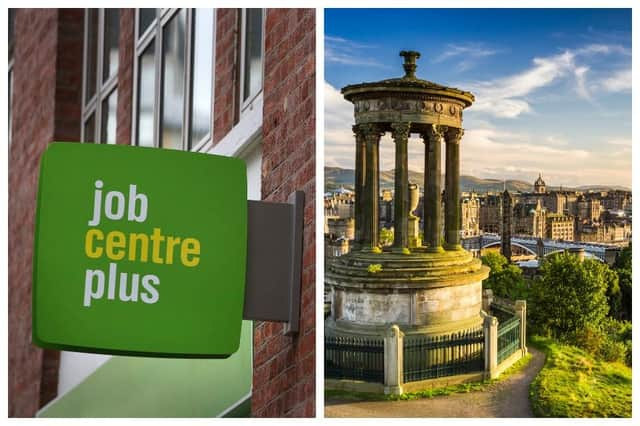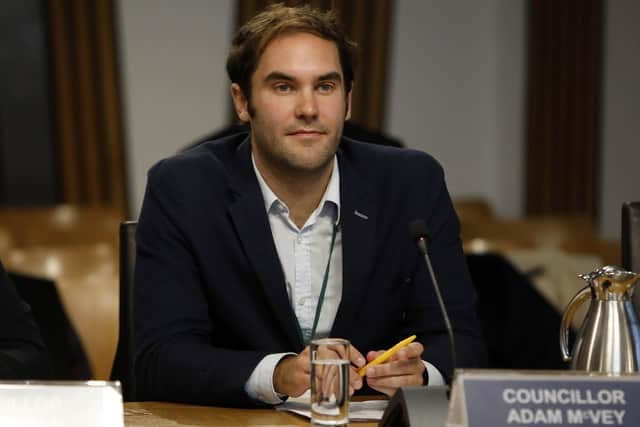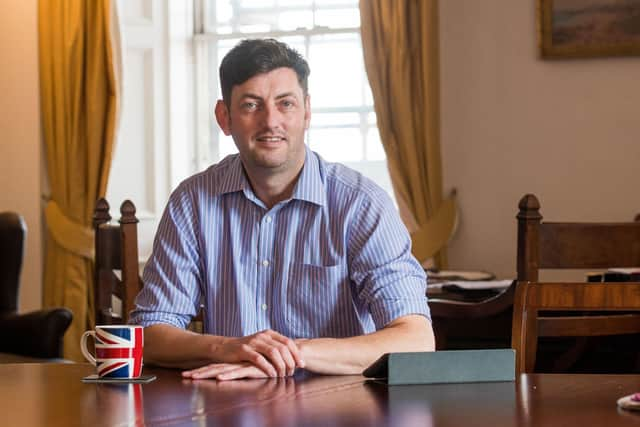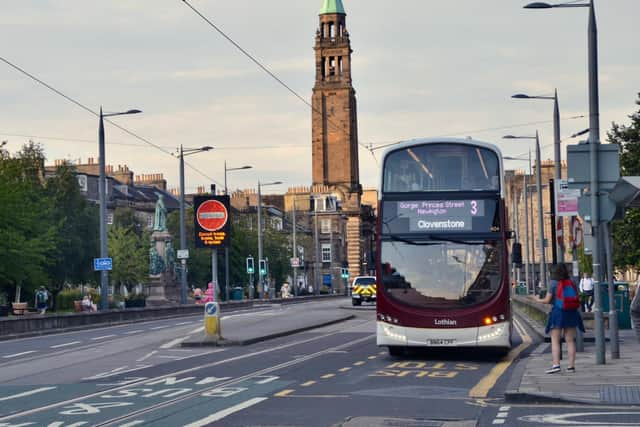'Stark and sobering' - More than a quarter of all jobs at risk in Edinburgh due to Covid-19


More than a quarter of Edinburgh’s economy is considered “at high risk” or in sectors “most exposed” to the coronavirus pandemic, figures obtained by the Evening News show.
During the Covid-19 crisis, the Capital has seen the fastest growth rate for unemployment benefit claimants than any other part of the country.
Advertisement
Hide AdAdvertisement
Hide AdA staggering 10,600 new claimants signed up for benefits between March and May 2020, a rise of 146 per cent since the beginning of lockdown.


Overall, the city has also seen 58,400 workers furloughed by the end of May, and almost 100,000 jobs in Edinburgh are in sectors rated as “high risk” to medium term coronavirus related disruption, representing more than a quarter of the city’s economy, a council briefing told councillors.
The briefing estimated that 36,000 retail jobs, 33,000 jobs in the hospitality sector, 11,000 in the arts and entertainment sector, and 9,000 jobs in both construction and manufacturing are considered “at highest risk”.
The figures have been described as “stark and sobering” by councillors, with calls for people to “think big and think brave” to avoid an impact on the wider Scottish economy.
Liberal Democrat councillor Kevin Lang called for “fresh thinking” and a focus on job retention in the short term and job creation in the long term.


He said: “These are stark and sobering figures and show just how exposed Edinburgh is to the economic downturn.
“We have gone from having almost full employment to a situation where a quarter of local jobs are considered at high risk.
“We clearly need fresh thinking and a new partnership between the Council, governments, businesses and the third sector if Edinburgh is going to weather this economic storm.
Advertisement
Hide AdAdvertisement
Hide AdConservative group chairman, Cllr Jason Rust said the pressure was now on the Scottish Government to work “collaboratively” with the UK Government to ensure a strong recovery.


He said: “These are startling figures and show the scale of the challenge that lies ahead. Locally, the preparedness of Edinburgh as a local authority and its engagement with business and employers is also vital.
“The city vision for thirty years time will come to nothing if the stark reality of the economic position now is not urgently addressed. It is clear that many key sectors in Edinburgh are facing a massive hit, with all the social costs that also entails for local families.”
Green finance spokesman, Clrr Gavin Corbett called for a ‘Green New Deal’ and for the £1.3bn City Region Deal to be revamped.
He said: “The economic impact of coronavirus has been massive and nowhere more so than Edinburgh given the size of the tourism and hospitality industries. Some of the ground is recoverable because the underlying demand is still there and I really hope businesses and workers can use the support available to hang on until that time.


“But that’s not enough. The city economy before Covid had major weaknesses. There should be no question of simply going back to the status quo.”
Edinburgh Council leader, the SNP’s Adam McVey, said more than £100m in support for businesses had been provided to help businesses battle Covid-19 and added the city was looking at “revitalising” its Edinburgh Guarantee scheme which helped provide jobs for young people after the financial crash of 2008 and 2009.
He said: “It has been crucial to plan for the citywide challenges which we know lie ahead and mitigate them as much as possible.
Advertisement
Hide AdAdvertisement
Hide Ad“Despite these efforts we’re already seeing unemployment rise and are looking at revitalising our Edinburgh Guarantee scheme, which successfully lifted thousands of young people out of unemployment and into jobs, training and education in the aftermath of the financial crisis.
“We want to extend this work to support people of all ages who might face barriers in the months and years ahead.
“From the outset, our priority has been supporting those who need it most through this crisis and that includes those who face financial hardship. Working with partners, we’ve delivered 10,000 food parcels to people across our communities, we’ve essentially put an end to rough sleeping in Edinburgh and we’ve issued £1m in Crisis Grants and Community Care grants.”
Depute leader, Cllr Cammy Day, warned more people could be made redundant as the furlough scheme winds down.
He said: “We’re determined to do all that we can to support those individuals and families who are most at risk of falling into financial hardship and I urge anyone who is struggling to reach out to us for vital access to welfare advice and benefits.
“We’re actively engaging with leaders in the employability and skills sector about how we support people back into jobs and positive destinations, and we’re calling on key employers to partner with us on this.”
Ewan Aitken, the former leader of the City of Edinburgh Council, who is now CEO of the Cyrenians charity, warned that unless people “think big and think brave,” the repercussions would be felt not just across the city, but the entire country.
He said: “Edinburgh is one of the key drivers of the national economy, and tourism is a key part of that. The city is a gateway for people coming into the country, and if we don’t grab hold of these problems, we’re in deep trouble.”
Advertisement
Hide AdAdvertisement
Hide AdMr Aitken characterised Edinburgh as an “hourglass economy,” with “incredibly well paid” jobs on one hand, and 21 per cent of children living in poverty on the other.
As the city seeks to chart a course out of the crisis, Mr Aitken said it was more important than ever that the public, private, and third sectors created a proactive plane which played to all their strengths.
He suggested that the city region deal should prioritise job creation in businesses which adopt a ‘social good’ approach, with the council ensuring any business tendering for public sector work has local supply chains to ensure the money stays within the city, and offering micro-loans for start-ups.
“As things stand, homeless presentations have gone up 17 per cent compared to last year, and more than 50 per cent of those people are doing so for the first time,” Mr Aitken added “They are two wee indicators of what will happen if we don’t fix things.”
Liz McAreavey, chief executive of Edinburgh Chamber of Commerce, described the figures in the council report as a “stark” and “graphic illustration” of the challenge facing the city.
She said: “Rising to this challenge will require all stakeholders – local and national government, businesses, third sector and others – to come together in a Team Edinburgh approach. The Chamber of Commerce will have a critical role to play in this.
Mary Alexander, deputy regional secretary of the Unite union in Scotland, echoed Mr Aitken’s concerns about the structure of the city economy and said its current precarious state was “very troubling” for Scotland as a whole.
“We are dealing with horrendous job losses already, such as at Edinburgh Airport, and it’s catastrophic for the economy,” she said.
Advertisement
Hide AdAdvertisement
Hide Ad“The pandemic has exposed inequalities in the system, and the precariousness of employment. If you look at the hospitality sector in Edinburgh, which has virtually collapsed, there are massive swaths of people who were on zero hours contracts and very low wages, and who are now really struggling.
Garry Clark, FSB Scotland’s development manager for the east coast of Scotland, called for the continuation of national support, such as an extension to the furlough scheme or additional grant, to help the city get back on its feet.
He said: “In terms of furloughs, Edinburgh North and Leith constituency was the highest in all of Scotland, so Covid-19 is having a massive impact on Edinburgh, and it’s going to be a very difficult summer and beyond, and it’s hard to know how things will pan out.
“At a council level, there are practical measures that can be taken to mitigate the impact of Covid-19 and support businesses. For example, we’ve been quite critical of the plans to close off swaths of parking in the city, and the impact that will have on businesses.
“On a national level, there is a need for a longer term commitment to the hospitality and tourism sectors, which are clearly going to be affected for a substantial amount of time.
”While it’s great many companies will be able to reopen soon, they have no festival to look forward to, which is absolutely integral to so many businesses in Edinburgh. That’s what sustains them for the rest of the year, and without it, it’s going to be exceptionally challenging - not just in the short term, but right through the winter.”
Another prominent member of the business community, Tracy Black, director of CBI Scotland, also said the need to protect those jobs under threat was paramount.
She said: “While further easing of lockdown measures will come as a relief to businesses across Scotland, many firms are already fighting just to keep the lights on.
“In areas like Edinburgh and the Highlands, where hospitality, leisure, and tourism are so important to the local economy, the need for action to protect jobs and livelihoods remains urgent.”
Comments
Want to join the conversation? Please or to comment on this article.